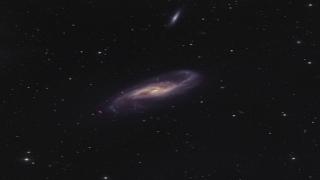Bibcode
Sánchez-Gallego, J. R.; Knapen, J. H.; Heiner, J. S.; Wilson, C. D.; Warren, B. E.; Allen, R. J.; Azimlu, M.; Barmby, P.; Bendo, G. J.; Comerón, S.; Israel, F. P.; Serjeant, S.; Tilanus, R. P. J.; Vlahakis, C.; van der Werf, P.
Bibliographical reference
Astronomy and Astrophysics, Volume 527, id.A16
Advertised on:
3
2011
Journal
Citations
8
Refereed citations
7
Description
We present the first complete 12CO J = 3-2 map of M 81,
observed as part of the Nearby Galaxies Legacy Survey being carried out
at the James Clerk Maxwell Telescope. We detect nine regions of
significant CO emission located at different positions within the spiral
arms, and confirm that the global CO emission in the galaxy is low. We
combine these data with a new Hα map obtained using the Isaac
Newton Telescope and archival H i, 24μm, and FUV images to uncover a
correlation between the molecular gas and star forming regions in M 81.
For the nine regions detected in CO J = 3-2, we combine our CO J = 3-2
data with existing CO J = 1-0 data to calculate line ratios. We find
that the ratio J = (3-2)/(1-0) is in agreement with the range of typical
values found in the literature (0.2-0.8). Making reasonable assumptions,
this allows us to constrain the hydrogen density to the range
(103-104) cm-3. We also estimated the
amount of hydrogen produced in photo-dissociation regions near the
locations where CO J = 3-2 was detected.
Related projects

Spiral Galaxies: Evolution and Consequences
Our small group is well known and respected internationally for our innovative and important work on various aspects of the structure and evolution of nearby spiral galaxies. We primarily use observations at various wavelengths, exploiting synergies that allow us to answer the most pertinent questions relating to what the main properties of
Johan Hendrik
Knapen Koelstra